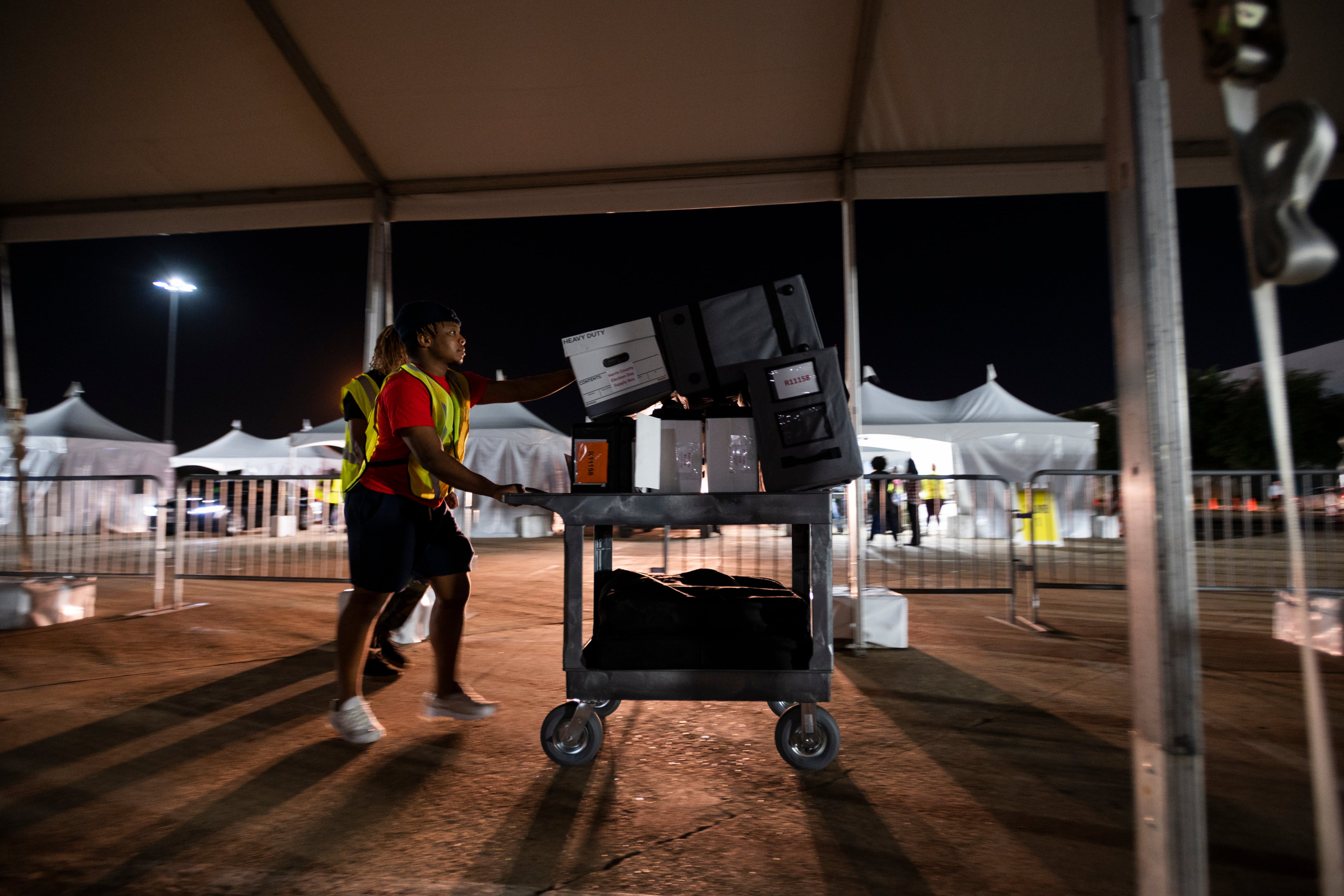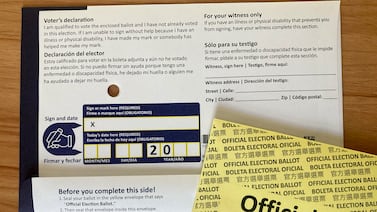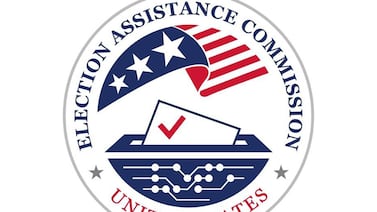Votebeat is a nonprofit news organization reporting on voting access and election administration across the U.S. Sign up for our free newsletters here.
A preliminary audit of Harris County’s 2022 election released last week by the Texas Secretary of State highlighted voter data discrepancies that could feed into fraud claims if they’re not clearly explained, even though such errors are not unusual, election experts say.
The audit, required by state law, points out that the county had completely different numbers of registered voters and different numbers of absentee ballots it sent out than what the state’s own data showed. The report didn’t suggest the data inconsistencies could have impacted the outcome of the November election or anyone’s ability to cast a ballot in the state’s most populous county, nor did the report detail the causes of the discrepancies.
“It’s important for everyone — Harris County, the secretary of state, and the media — to make clear the line between discrepancies and any actual issue with disenfranchisement or fraud, since the two are easily conflated,” said Michael Morse, an assistant professor of law at the University of Pennsylvania who has done research on voting list maintenance systems.
Harris is one of nearly 40 counties in Texas that keep a voter registration data system independently from the statewide voter registration list. That means the county’s data has to be frequently uploaded and synchronized with the state’s database.
It isn’t clear what happened in Harris. A spokesperson for the county tax assessor-collector’s office, which is now in charge of voter registration, told Votebeat they could not explain the discrepancies in the report because that data was handled by the now-abolished election administration department.
Morse and other experts say it’s not uncommon for data inconsistencies to occur in counties where election officials are inputting large amounts of data into multiple systems at various times. That’s particularly true with a database such as a voter roll, which is in constant flux as voters move or die. In addition, because the voter roll is always changing, reports run on different dates can show different numbers.
Discrepancies “are unique to counties who have their own system and feed data up to the state’s database, versus the counties who put the data directly into the state system,” said Ryan Macias, an election administration, security, and technology expert and founder of the elections consulting company RSM Elections Solutions.
In this case, the state’s preliminary audit said Harris County’s voter registration system had more than 9,000 additional voters compared to the number the county had reported to the statewide voter registration system. Two other reports showed around 25,000 less voters than the statewide system’s number.
In addition, Harris County documented sending out nearly 3,600 more mail ballots to voters than the number it reported to the state.
This isn’t the first time a state audit team has flagged such discrepancies when conducting an audit. Last year, it found similar inconsistencies when reviewing Harris, Dallas, Tarrant, and Collin counties’ conduct of the November 2020 election. All four counties use independent voter registration data systems.
In that 2020 audit report, state officials urged county election administrators to “rectify the issue or provide an explanation” when data is not consistent across platforms.
The state is now auditing four counties’ handling of the 2021-2022 election cycle, but has only released the preliminary findings into Harris County, which has had a series of high-profile problems administering elections. The heavily Democratic county’s handling of elections has made it a target of Republican state lawmakers, who earlier this year passed a law that dismantled its elections office.
The preliminary report released last week listed other early findings, including that the county failed to adequately train election workers and failed to supply some polling locations with enough ballot paper.
How Texas counties manage their voter registration lists
A federal law, the Help America Vote Act, requires states to develop and implement “a single, uniform, official, centralized, interactive computerized statewide voter registration list.” Exactly how that’s done varies by state.
Some states have one central database that connects to terminals in local jurisdictions. Other states gather and aggregate information from each local jurisdiction’s separate voter registration database.
Texas uses a combination of those methods.
The majority of counties in the state input their voter registration data directly into a statewide voter registration system. The rest, including Harris and most of the other large counties, manage their own voter registration lists through a vendor. Harris uses VOTEC, whose Vemacs voter registration platform is certified by the secretary of state. That data is then synced with the statewide system.
Election officials in each county are responsible for providing “accurate and timely voter registration numbers across all platforms to ensure consistent reporting,” the audit draft says.
According to the preliminary audit report on Harris, that syncing process includes verifying voter status, registration dates, and multiple other pieces of information. Harris County staff told state officials that at the end of each day of early voting and on election day, voter participation is imported from the county’s electronic poll books into their voter registration system. Once that transfer is complete, the information is then submitted to the statewide system for posting on the secretary of state’s website, the report says.
Some election officials say using a third-party vendor to manage voter registration data allows the county to control how its data is stored and the procedures used to gather it.
“We’re able to manage the data in a way that best serves our county,” said Remi Garza, Cameron County elections administrator, whose department is also currently under review by the state, along with Guadalupe and Eastland counties. “With a third-party vendor, we are their customer so we have the ability to directly ask them for changes in how data is formatted and the type of reports we want to run to review voter information.”
Voter registration lists are updated constantly. “But there’s sometimes also technical reasons why data doesn’t always sync up perfectly,” Garza said.
Why it’s important that voter registration data and election data is consistent
In the report, the secretary of state acknowledged “the complexity of exact matching due to the timing and coordination of system snapshots while voter registration is still occurring,” but added that the disparities leave it unable to “definitively measure voter turnout and additional required statistical reporting.”
In addition, there are inconsistencies in reporting across the multiple vendor systems used by Harris County in every phase of the mail ballot process, the report says. This includes the number of ballots mailed, received, accepted, or rejected.
The county’s ballot by mail reports showed that 81,070 ballots were mailed for the November 8, 2022 general election. But when compared to the data the county reported to the statewide voter registration system, there was a difference of 3,583 ballots. Another discrepancy also appeared in the county’s post-election report, which showed that 81,064 mail ballots sent to voters.
Why are Harris County elections under review again?
A sweeping voting bill passed by Texas lawmakers in 2021 — which was ignited by baseless claims of voter fraud in the November 2020 election — included a provision requiring the Texas secretary of state to conduct an audit of four randomly selected counties’ elections.
Harris County was randomly selected in a drawing for the review of the 2021-2022 election cycle along with Guadalupe, Eastland, and Cameron counties. So far, these are the only findings the secretary of state has released.
Alicia Pierce, the secretary of state’s office spokesperson, could not yet provide an estimate of when the full report with the review of the other counties would be released. In the report, the office says it expedited its review of Harris County’s November 2022 general election “to address outstanding questions related to the distribution of equipment and supplies.”
Since July, Texas Secretary of State Jane Nelson has been under pressure from conservative activists — including one Harris County Republican losing candidate challenging the outcome of the election — to release the results of the audit. On social media some were calling for Nelson “to do her job!” and release the report.
The county’s elections administrators and the department have been under intense scrutiny for a year, since paper ballot shortages, malfunctioning equipment and long wait times at several polling locations prompted Texas Republican lawmakers to pass a law that abolished the elections administrator in Harris County. Election administration duties, as of Sept. 1, were transferred to the county clerk and voter registration duties are now the responsibility of the tax assessor-collector’s office.
The secretary of state’s office said it expedited the report in order to provide the new election and voter registration officers information “to address any process and procedure changes that may be necessary prior to the 2024 election cycle.”
The problems in Harris in November prompted several losing Republican candidates to go to court seeking a redo of the November election. At least two of those lawsuits were dropped by the candidates. Several others are still moving through the courts.
Moving forward, Harris County Clerk Teneshia Hudspeth said she’ll continue to review and address every aspect of the election process “until procedures are in place that will ensure past issues are not repeated,” she said in a statement.
A spokesperson for the county’s tax assessor-collector, Ann Harris Bennett said the office received Harris County’s voter roll Sept. 1 and have since followed the secretary of state’s rules and guidelines to manage the county’s voter rolls.
Natalia Contreras covers election administration and voting access for Votebeat in partnership with the Texas Tribune. Contact Natalia at ncontreras@votebeat.org








